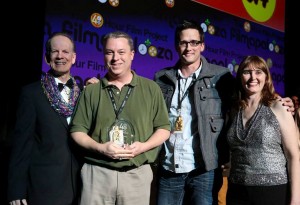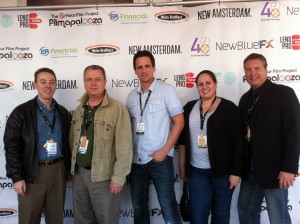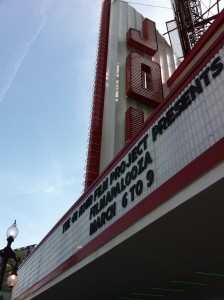Filmapalooza: hard to win in Big Easy
Movies compete in New Orleans for chance at Cannes
From The Orlando Weekly, March 24, 2014
So whatever happened to TechSquad, the little film that could – and did – at the 48 Hour Film Project last summer in Orlando? (See my original story and follow-up blog.) Because it won its city, the buddy comedy moved on to the international competition, Filmapalooza, on March 6-9 in New Orleans, competing against 111 other short movies from around the world.
But that’s where the journey for TL Westgate’s film ended, as it was not selected as one of the top 10 entries and therefore won’t go on to the Cannes Film Festival in May. But at least we finally have an answer to the question that was on everyone’s mind during this year’s Project: Is it possible to make not just a professional, entertaining film – which TechSquad certainly is – but a really good one in just 48 hours? The answer is a resounding yes, as demonstrated by at least a dozen films from big cities such as Los Angeles, Paris and Washington, D.C., but also by offerings from less predictable places such as Breda, Netherlands; Portland, Oregon; and Kansas City, Missouri.
“I had an amazing experience at Filmapalooza,” Westgate says. “TechSquad is my first film to win the 48 Hour Film Project and go on to ANY festivals. It’s been a wild ride, and Filmapalooza was definitely a highlight. It was great to mingle with all the other filmmakers from across the country and around the world. I didn’t know quite what to expect out of it. I’ve only been to a few fests so far. I really enjoy the panels and parties and networking opportunities, and of course, seeing the films that are winning other cities.
“As far as the quality of the films, some were amazing. … The level at which the writing and acting were delivered was definitely at a Hollywood level. In many cases, if you didn’t know these were produced in 48 hours, you would never guess. The entire 48-hour concept seems to have a stigma on the festival circuit. And it can certainly produce some clunkers. But when a team hits it out of the park, they should definitely get bonus points for doing so in such a short time. Frankly, I was humbled by the quality of some of the films I watched and see I definitely need to step up my game for next year.
“The number-one winning team from Amsterdam starred one of their country’s biggest actors. So thinking you’re going to Cannes is a bit of a pipe dream. I can’t say I’m disappointed in not going, as I didn’t really think we’d make it. It would have been nice, [but] this whole experience has only pushed me to try harder. Maybe someday.”

TL Westgate and co-star Hans Christianson accept their award for the best film in Orlando, from Mark Ruppert (far left) and Liz Langston. (photo by Rob Hatch)
To refresh, the 48 Hour Film Project, which was founded in 2001 by Mark Ruppert and Liz Langston, is a timed filmmaking competition. As the name suggests, participants have just two days to complete a film between four and seven minutes in length, not including end credits. Filmmakers cannot pay anyone, but they can form their team and acquire equipment in advance. And to prevent teams from writing and shooting beforehand, participants are assigned a genre, line of dialogue, prop, and character name and trait when the competition starts.
“We all agree that it was our best Filmapalooza yet,” Langston says. “And, honestly, I have to say that what made it that way was just seeing the filmmakers be so friendly to each other and take such an interest in being supportive and learning about each other and watching each other’s films. I think [the top 10] films are excellent films, and we’re very proud of them.”
The quality of the films screened at Filmapalooza was so high this year, in fact, that it’s difficult to believe they were all made in 48 hours. Well, if you dig a bit deeper, you’ll actually discover that many technically weren’t.
“We send an e-mail out to all of the filmmakers [of the winning city films], and we tell them that they can make some very particular, small changes to their films, and that includes sweetening the audio and, if they’ve forgotten any title credits, they can add those in. We don’t allow any changes to the stories – insertions, deletions – but we do want the films to be shown at their very best.”
Langston cautions that although the Filmapalooza audience, and ultimately the Cannes audience, might see tweaked films, the judges see the films without tweaks, guaranteeing a fair comparison, since many filmmakers choose not to change their movies following the 48-hour creation process. Still, some claim that cheating does take place.
“As you know, people have to draw the character, prop and the line of dialogue, and the genre, so those are our best ways to have people stick within the boundaries of our 48 [Hour Film Project],” Langston says. “People will come to us occasionally and say that they think somebody cheated and wrote … in advance, and then what we do is we follow some procedures to check it out and see if it’s true. And if we do find that there was some provable cheating like that, then we have been known to take an award away from a winning team.”
In addition to the 112 films from the 48 Hour Film Project, Filmapalooza screened eight additional short movies this year. That extra group was comprised of the overall winner and audience pick from the National Film Challenge and six films from the 48 Hour Music Video Project.
For many attendees, the movies themselves aren’t the highlight of Filmapalooza. Some mention the informational seminars, while some cite the parties or the awards ceremony, which was hosted this time by David Costabile of Breaking Bad. This year’s social highlight was either the karaoke night or the post-Mardi Gras pub crawl through the French Quarter, complete with an old-fashioned crawfish boil. However, Kara Sowles of Portland, Oregon, cites the same thing Langston does.
“The most striking thing about Filmapalooza wasn’t the quality of the films, which were of course very impressive,” Sowles says. “The striking thing was the friendliness of the filmmakers, people all around the world who had found it worthwhile to crush themselves for two days, to burn favors and forget sleep. The filmmakers were, above all, friendly and welcoming to each other, without a sense of competition or pretention. This defined the festival for me.”
Sowles was the lead animator of Miasma, and if you think it’s tough creating a live-action film in 48 hours, try a stop-motion animation one.
“The visual feel of the film is crucial when you’re working with timed stop-motion,” she says. “We build the sets first, while we’re still working on the story and the characters, because the setting is the biggest character. It dominates the impact of the film for us. For Miasma, we quickly knew we wanted to work with a black-and-white palette, somewhere cold and isolated. Because we had to build everything from scratch, we couldn’t start animating and filming until around 8 p.m. Saturday night, halfway into the race [which ended Sunday evening]. Afterwards, it feels as much like magic to us as it does to the audience. I’m never quite sure how it happened, but there it is.”
Despite that magic, Miasma wasn’t selected for Cannes. Neither was the Kansas City winner, The Donald Gordon Story, a fascinatingly playful, deconstructionist look at a man who discovers that a magical, ethereal camera is filming his entire life. Think of it as an even more existential version of The Truman Show. But that snub didn’t seem to ruin the experience for the film’s director and writer, Joe Carey.
“Filmapalooza was one of the most extraordinary experiences of this young Kansas City boy’s life,” Carey says. “At first I was terrified because I was surrounded by filmmakers from across the globe, the best of the best. As the weekend went on, I realized that most of the people there were in the same boat as me. Some films clearly had production companies with money to back them up, but the majority were small teams just working with what they had.

Left to right: Cameron Meier, TL Westgate, Hans Christianson, co-writer Michelle Bretana and fellow Orlando filmmaker Dale Metz, on the red carpet at Filmapalooza
“I don’t fully agree with the winners, but that is the nature of the beast. The winning films all had a stunning quality to them. They looked great and definitely made you feel like you were watching a movie. That being said, the stories were not necessarily all there. Some films had an amazing story but didn’t look nearly as polished. They all fell to the wayside, ours included. Then there were a couple that had both amazing quality and a good story, but I guess they rubbed the judges the wrong way. All in all, it was amazing meeting so many like-minded people from all walks of life.”
Carey’s suggestions for future filmmaking teams?
“The biggest piece of advice when it comes to timed festivals is this: Prepare beforehand [while still adhering to the rules.] It’s a double-edged sword, because if you prepare too much, you will lose the originality and creativity that is so great about these things. However, if you do prepare, be sure to rent out a train station,” Carey jokes, referring to the filmmakers from Cape Town, South Africa, who secured the use of a train and a station for their film, Five Minutes Till Noon (http://vimeo.com/77905389), while still adhering to the rules that forbid paying anyone. Not surprisingly, they won for best art direction. Concludes Carey: “Seriously? How am I supposed to compare with that?!”
With the exceptions of Miasma, The Donald Gordon Story and a wonderfully surreal film from Breda, Netherlands, my list of favorites is pretty close to the judges’. If you’ll indulge me, below you’ll find my top 10 and a couple of honorable mentions, along with links to the films, if available. Films with asterisks are in the judges’ top 10 and will, therefore, be going to Cannes. (For a complete list of the judges’ other awards, such as best actor, best director and best cinematography, visit http://www.48hourfilm.com/filmapalooza/.)
My top 10:
- Breda, Netherlands (ESC) – 4 stars (on 0-5 scale): http://www.youtube.com/watch?v=W93tF6nOT74
- Los Angeles (Coverage) * – 4 stars
- Osaka, Japan (My Sweets) * – 4 stars
- Portland, Oregon (Miasma) – 4 stars: http://www.youtube.com/watch?v=Ql4loQbzN9Y
- Lausanne, Switzerland (Le Grand Ecart, or The Split) * – 4 stars: http://www.youtube.com/watch?v=L7tIl-sFOt0
- Paris (Le Métronome), second runner-up * – 3 stars: http://www.youtube.com/watch?v=ICY2bocNsh0
- Kansas City, Missouri (The Donald Gordon Story) – 3 stars: http://vimeo.com/74117401
- New York City (Once a Loser) – 3 stars
- Washington, D.C. (Wishful Thinking) * – 3 stars: http://www.youtube.com/watch?v=MgKz9ja56yw
- Amsterdam (Geen Klote!, or No Guts!) *, overall winner – 3 stars: http://vimeo.com/66865730
My honorable mentions:
Dublin (Dear Younger Me) – 3 stars: http://vimeo.com/76694170
Utrecht, Netherlands (Blokje Om, or Around the Block) – 3 stars: http://vimeo.com/82522874
Films in the judges’ top 10 but not mine:
Katowice, Poland (Nikisz Haze) * – 3 stars: http://vimeo.com/80212772
Rome (La Bouillabaisse) *, first runner-up – 2 stars
Johannesburg, South Africa (Don’t Shoot the Cat) * – 2 stars
Nijmegen, Netherlands (Mama’s As) * – 2 stars
The 48 Hour Film Project for 2014 is already underway. Orlando’s contest will likely take place again in August. For information on how you can enter the competition in your city, visit https://www.48hourfilm.com/. Next year’s Filmapalooza will be held in Los Angeles, possibly at Hollywood’s famous Chinese Theatre, on March 5-9.
Epilogue
In an amazing twist ending straight out of a sappy but heartwarming Hollywood movie, Kansas City’s Joe Carey WILL be going to Cannes after all. Apparently there was room for four more films, in addition to the original 10, and The Donald Gordon Story is among the four, it was announced on April 3. The other three are New York City’s Once a Loser (also among my personal top 10); Melbourne, Australia’s Flash; and Glasgow, Scotland’s The Job.
Sadly, Kara Sowles of Portland, Oregon (Miasma) and Orlando’s own TL Westgate (TechSquad) didn’t make this new list. Neither did the team from Breda, Netherlands, who made ESC, the best movie at Filmapalooza, in my opinion. Oh, well, there’s always next year.
© 2014 Orlando Weekly / MeierMovies, LLC
